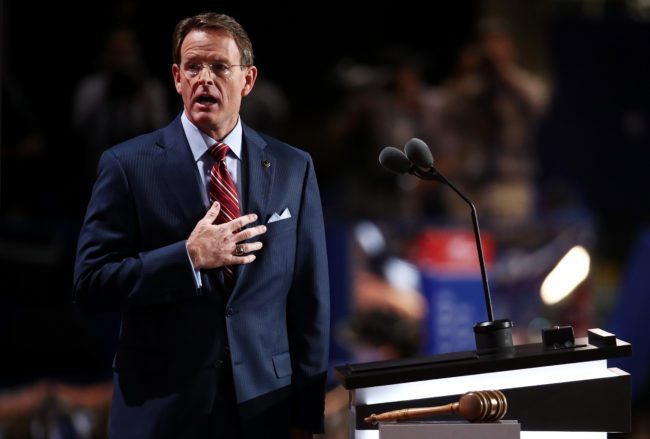Anti-LGBT activists subpoenaed over allegations they helped draft Trump transgender troop ban

President Donald Trump speaks to the as Vice President Mike Pence looks on (Mark Wilson/Getty Images)
An anti-LGBT lobbying group is fighting to keep details of its discussions with the Trump administration private – after a subpoena directed activists to turn over documents relating to the transgender troop ban.
Donald Trump announced on Twitter in July 2017 that all transgender servicepeople would be purged from the US armed forces, claiming they were a “burden” on the military.
Despite a string of lawsuits, the White House issued a formal policy document last month that backed the stance by citing transgender people’s “high rates of mental health conditions such as anxiety, depression, and substance use disorders” and “extremely high rates of suicidal ideation and other comorbidities.” The document also claimed that “transition-related treatment is proving to be disproportionately costly.”
Leading and military experts came forward to deride the claims, with the American Medical Association stressing that there is “no medically valid reason to exclude transgender individuals from service.” Two former Surgeons General also rubbished the Trump administration’s report.
It has since been alleged that Vice President Mike Pence played a leading role in the creation of that report alongside anti-LGBT lobbyists from the Heritage Foundation and Family Research Council, working over the head of Defense Secretary Jim Mattis.
The Family Research Council now says it has been served with a subpoena to disclose its documents relating to the policy.
Tony Perkins of FRC told supporters: “[LGBT activists] have resorted to one of their favourite avenues to impose their fringe agenda: the court system.

Tony Perkins (Fox News Channel)
“They have issued subpoenas, demanding that we produce all communications on the topic between senior leaders at Family Research Council and the administration.
“We’ve had to hire a law firm to represent us in the case, and our lawyers have objected to this demand, asserting our First Amendment religious freedom and speech rights. The LGBT activist groups have now filed a motion seeking a court order compelling us to turn over the privileged documents.
“Let me be clear, the purpose of these subpoenas is not to resolve any constitutional questions. Their intent is clear – to intimidate FRC and our supporters from standing up for our military service members.
“They also know that it takes significant time and resources to respond to subpoenas, scarce time and resources that we should be focusing on advancing faith, family, and freedom.”
Perkins added: “As a trusted friend of FRC, I wanted to make you aware of this developing situation and ask for your prayers.”

Tony Perkins, President of the Family Researcil Council, stand for the Pledge of Allegiance on the fourth day of the Republican National Convention (Win McNamee/Getty)
There are a string of lawsuits in progress connected to the transgender ban, and district court judges have already issued injunctions blocking the policy from coming into effect.
GLBTQ Legal Advocates & Defenders (GLAD) and National Center for Lesbian Rights (NCLR) are behind Doe v. Trump, the first of four cases filed against the ban.
Of the administration’s recently-outlined plans, Jennifer Levi of GLAD said: “This Trump-Pence plan categorically bans transgender people from service, with no legitimate basis. It requires the discharge of trained, skilled troops who have served honourably for decades. It’s a gross mischaracterisation of transgender people, and it’s bad for our military.”
Shannon Minter of NCLR added: “This is exactly the discriminatory, categorical ban that four federal courts have already barred from going forward.
“This is just the sort of baseless attack on dedicated service members we have come to expect from this administration, and we will continue to fight this shameful ban vigorously in federal court.”
Former U.S. Surgeons General M. Joycelyn Elders and David Satcher previously warned against the ban.
They said: “We are troubled that the Defense Department’s report on transgender military service has mischaracterised the robust body of peer-reviewed research on the effectiveness of transgender medical care as demonstrating ‘considerable scientific uncertainty.’
“In fact, there is a global medical consensus that such care is reliable, safe and effective. An expectation of certainty is an unrealistic and counterproductive standard of evidence for health policy—whether civilian or military—because even the most well-established medical treatments could not satisfy that standard. Indeed, setting certainty as a standard suggests an inability to refute the research.
“A wide body of reputable, peer-reviewed research has demonstrated to psychological and health experts that treatments for gender dysphoria are effective.
“Research on the effectiveness of medical care for gender dysphoria was the basis of the American Medical Association’s 2015 resolution that ‘there is no medically valid reason to exclude transgender individuals from service in the U.S. military,’ and we expressed our support for the resolution at the time of its passage.
“In light of [the] announcement concerning military policy for transgender service members, we underscore that transgender troops are as medically fit as their non-transgender peers and that there is no medically valid reason—including a diagnosis of gender dysphoria—to exclude them from military service or to limit their access to medically necessary care.”

A U.S Marine (Ian Hitchcock/Getty Images)
The American Psychological Association also condemned the Trump administration’s stance.
It said: “The American Psychological Association is alarmed by the administration’s misuse of psychological science to stigmatise transgender Americans and justify limiting their ability to serve in uniform and access medically necessary health care.
“Substantial psychological research shows that gender dysphoria is a treatable condition, and does not, by itself, limit the ability of individuals to function well and excel in their work, including in military service. The science is clear that individuals who are adequately treated for gender dysphoria should not be considered mentally unstable. Additionally, the incidence of gender dysphoria is extremely low.
“No scientific evidence has shown that allowing transgender people to serve in the armed forces has an adverse impact on readiness or unit cohesion. What research does show is that discrimination and stigma undermine morale and readiness by creating a significant source of stress for sexual minorities that can harm their health and well-being.”
At a press conference last month, Trump’s Defense Secretary Mattis refused to answer any questions about the issue.

